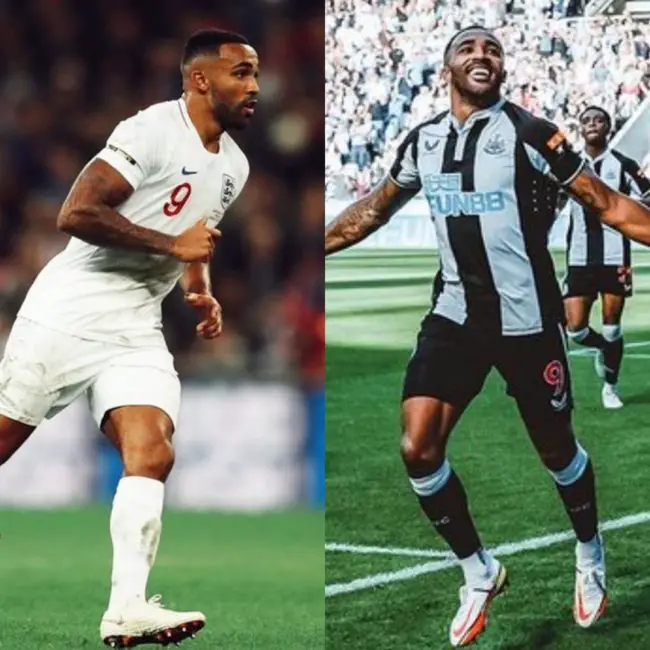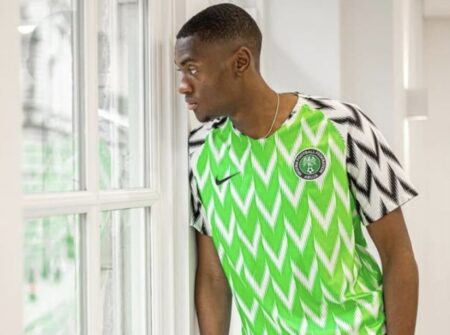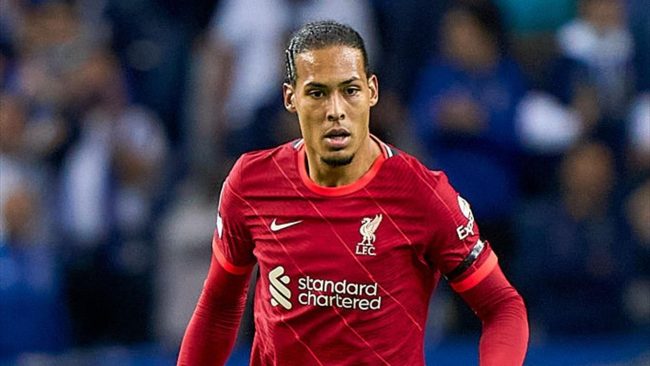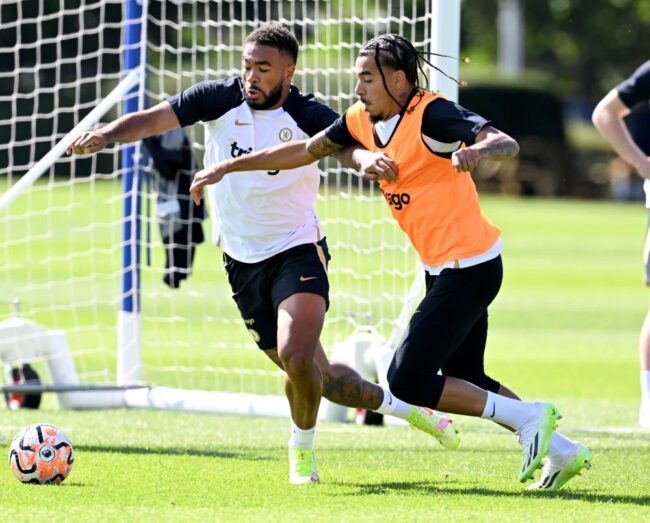England and Newcastle Uniteds triker, Callum Wilson, says he is looking forward to making the England squad, on merit, to the Qatar 2022 FIFA World Cup.
The FIFA World Cup is set to take place between November 20 and December 18 2022.
Wilson hasn’t played for the Three Lions since a Euro 2020 qualifier against Bulgaria on October 14, 2019 – the game that ended 6-0 in favour of England with Ross Barkley and Raheem Sterling scoring two goals each, while Harry Kane and Marcus Rashford scored one goal apiece.
Wilson, 30, has scored one goal in four appearances for England.
Also Read: Fenerbahce Vs Austria Wien – Preview And Predictions
Wilson is in good form this season with two goals in three Premier League games so far.
While co-hosting the Footballer’s Football Podcast on BBC Radio 5 Live with West Ham striker, Michail Antonio, Wilson boldly proclaimed that he will be travelling to the World Cup with the England squad after he would have merited his inclusion in Gareth Southgate’s squad.
“You’re taking Harry Kane, you’re taking myself, Tammy Abraham is also doing well,” Wilson said.
“You’ve got Ollie Watkins and Danny Ings, who are also doing well.
“I’m on the plane, Harry Kane’s on the plane. There are going to be players travelling to the World Cup that don’t make the September squad. There’s always one or two players who come from nowhere.
“For me, you’re going – Kane, myself, Tammy Abraham who’s a different kind of striker, and then you’re probably taking Danny Ings. That would probably be my four, form-dependent.
“I’m trying to do my talking on the pitch. I always say I don’t want to talk my way into a squad. I want the football to do the talking for me.”
England are in Group B alongside Iran, the United States of America and Wales.
By Toju Sote








13 Comments
On current form, Brentford’s Ivan Toney has got to be in the conversation.
The sure banker, barring injury or a monumental loss of form, is of course Harry Kane. We’ll see who Northgate picks alongside Harry in the hunt for England’s 2nd world cup.
I always laugh at black players who think they’ve got a chance with England. England is not France that will pick majority black players.
England at best will pick no more than 4 black players to start in any major competition i.e. UEFA or World Cup. Yes, in friendlies they will hand out caps to black players ensuring that those players cannot play elsewhere and when you research the caps of Anglo-Nigerian England players – who unlike West Indians have a credible alternative national team, the majority historically have less than 10 caps starting from John Salako, John Fashanu, Ugo Ehiougu, Gabriel Agbonlahor, Fikayo Tomori, etc.
Harry Kane would always be the choice English starter as a striker because he’s white. Any black player would be secondary to a white player of equal competence or even slightly lesser competence, and tactical formations are deliberately altered or implemented to ensure this. And then there is the added qualification that they’ll never pick more than 4 black players as starters in competitive matches.
This was displayed most recently with the England women’s team that won the UEFA women’s championship. Despite a history that has included black girls like Eniola Aluko – once top scorer and a current squad with 4 black players, all the starting players in the recent UEFA final were white and the lone black female player came on as a substitute. As soon as the women’s game started getting public attention it was whitewashed.
English white players are all overpriced in the transfer market by as much as 50%. They are unique in Europe for never exposing themselves to the rigor and challenge of playing in foreign climes, only the exceptional English white player plays in foreign climes and for outsized wages in the best clubs, the likes of Real Madrid, Barcelona, etc.
The English black players on the other hand – especially the Anglo-Nigerians, gain valuable experience in German, Spanish, Italian, and Turkish leagues. Mainly in order to prevent the structural racism in English football from downgrading them into mediocre teams.
So, Abraham, Tomori (being astute Nigerian) and knowing that their abilities would not be fully recognized, exercised the option of going abroad, else they would have found themselves playing at the mediocre end of the premiership for the likes of Watford, Aston Villa, Fulham…if not in the championship.
Black players need to recognize this reality, if they want a few caps for England from friendlies, then fine. If you want to display your talent on an international stage, then England is not for you unless you are truly exceptional in the position you play.
And the English Media is always quick to criticize black players. Man Utd’s problem according to media pundits was Paul Pogba, and Chelsea’s with Lukaku, but as soon as they left, everyone can see that the problems are with – in Man Utd’s case, white players McTominay and Maguire. Chelsea still can’t score because the coach doesn’t play in a way that encourages free scoring.
The value of black players to the England team starts with strikers. If you’re a striker and black, you have a good chance. Followed by wingers, black wingers tend to get some recognition but not as much as strikers. Then fullbacks. Then midfield players and finally centrebacks.
So if you’re black and play centre forward or on the wings chances are if you’re good like Bukayo Saka you’ll get regularly called up by England. If you’re a centre-back or in midfield, the competition for those positions not requiring much skill is greater and chances are as a black player you’ll not make the regular selection.
AngloNigerian players like Tosin Adarabioyo holding out for England regular selection as centre-back are wasting their time. Even if selected they’ll just get a few caps before being discarded.
Critical analysis! A lot of people here don’t get it and may never get it. Soon, they’ll label you a bigot and a racist. They are comfortable with their Stone Age way of thinking. They have a disdain for people of their own kind but worship people of a different skin pigmentation.
Have all these ”happy-to- eat crumbs-off the master’s table” ever stopped to ask themselves why all these great black English soccer players could play the game at the highest level but are not deemed good enough to coach it at the highest level?
They come here to maliciously criticize a majority of Nigeria’s ex-players for not getting coaching jobs in Europe but fail to understand that unless you are willing to cow-tail to them, be controlled and dictated to, you will be overlooked. Nigerians have a different mindset compared to Senegalese, Ivorians and other Africans.
Mr. Sunday Oliseh and Mr. Augustine Eguavoen are heroes in this country. A lot of people would kill to achieve half of what both men have accomplished in their lives so far.
Take that, haters!
Sorry, I meant, ”cow-tow to them…”
History does not support the suggestion that deserving black players are unfairly excluded from the 3 Lions, or from top English clubs. Black players of all types over the years have played for the 3 Lions and top English clubs, and will continue to play. The deciding factor is of course, talent. If the individual is considered needed, he will be sought out.
Black center backs like Rio Ferdinand and Sol Campbell are examples. They not only played for England, they captained the team at a point in their international careers. They also played for and captained top English clubs.
Take a look at this link and see a long list of black players, many of whom in the past or presently wore the 3 Lions jersey. All on the list also played in the premier league. They all had white competition, but that did not stop them.
I don’t know about all English players being over-priced, but I will tell you categorically that Harry Kane is not over-priced or over-rated. Kane is one of the best forwards in the world, hands down. England may not be very successful on the international stage, but the country has produced much talent, many of whom were among the best in their trade while they played the game. The same can be said of many who are currently playing. So if Kane is the first choice striker for England today, it has absolutely nothing to do with his white skin. It has everything to do with his lethal goal-scoring and assist generating ability. If players like Sterling, Rashford, Sancho, and other black players were better than Kane, the starting line up will be updated post haste to reflect that. National teams around the world including England prioritize success higher than racial considerations, and if a talent as dark as charcoal shows that he can fill a critical need in the national team, he will be selected ahead of his white English counterparts.
If Adarabioyo has little to no chance of making the 3 Lions squad, it has more to do with his inferior talent than the color of his skin. He has a battle on his hands getting into the England squad ahead of the likes of Stones, Coady, Mee, Tomori, Smalling, the much maligned Maguire, Dier, Keane, Gomez, etc. If he is eventually excluded, it would be strange to attribute his exclusion to his skin color!
Excellent Post from @pompei not everything is about race but some folks just refuse to accept that, national teams that put success first use a combination of video analysis and performance based statistical data metrics to review and judge potential national team players. So skin color is not a criteria.
Top marks Pompei. I need not say more.
Harriet Tubman – “If I could have convinced more slaves that they were slaves, I could have freed thousands more.”
I would normally have let your post go without replying but this is an issue of importance. You and others are perfectly entitled to the view you espouse, but having raised the matter I owe it to readers of this thread to reply.
Firstly at no time did I state that Black players are not chosen for selection by England, any more than I would state that black people are refused employment in the UK. But because black people are able to gain employment doesn’t mean they’re not discriminated against within such employment. Go ask doctors, nurses, and other black professionals employed in the UK if they have the same promotional, disciplinary, and career opportunities that their white colleagues enjoy.
Go look at the list of UK professionals – lawyers, accountants doctors, etc., suspended from their professions for some misdemeanor and the names that would leap out at you are minority names including Nigerian. This is a fact acknowledged by research and institutional authorities in the UK.
So why should you be surprised that football is similar? Because overt racism has been eliminated doesn’t mean the covert type doesn’t exist. It does and it means that there is a disparity in the equivalence of treatment for promotion, discipline, and job security.
Over 40% of the footballers in the English leagues are black, that is not just a statement of the outsized representation of the UK’s black population but also of their excellence in sporting activities. In ancillary sports like athletics, they dominate expressing both their tenacity, physical disposition, and competitive inclinations. It is undeniable that black players in the last 30 years have been giving access to appearing for England and more generally playing at clubs.
Yet at the coaching level they’re largely marked by their absence, a division of labour created by a society that views black people as only suitable for physical endeavours.
You may ask why this is so, I know that as far as the 80s and 90s white English football coaches operated a ‘closed shop’ into their profession. How was this implemented? They refused to cooperate with any non-white/non-English coach in transfer dealings. It was Chelsea’s Ruud Gullit that broke this mould. He did this by ignoring the domestic league and buying foreign players from Italy and elsewhere to bolster his squad. He started the Chelsea renaissance later picked up by Abramovic.
My initial comment was intended to be addressed specifically to players of Nigerian origin to advice them of the pitfalls in making choices on national teams. I state that there is an emerging covert trend, of discriminatory selection, discriminatory media focus.
I sought to advice a Nigerian player making nationality choices of those pitfalls, and how they should navigate around them. You unfortunately chose to ‘hide behind one finger’by denying the existence of these pitfalls ensuring they’re never brought into the open and discussed, and if found solutions to address them are never made. If you deny the existence of a situation – real or not, then there is no hope of addressing or rectifying it.
That’s why I quoted Harriet Tubman’s, “If I could have convinced more slaves that they were slaves, I could have freed thousands more.” This is message of both victim denial of their circumstance and perpetrator denial.
I was watching a Cremonense match with Dessers playing last week, the English commentator on Dessers receiving the ball stated, “and here is the Nigerian Dessers…”. Why was he drawing attention to Dessers nationality. Dessers is more Dutch than Nigerian by nationality but has chosen to play for the SE. He was drawing attention to his audience to discount or scrutinise harshly the performance of Dessers because he was Nigerian or in particular playing for Nigeria.
And this is not an isolated case, Super Eagles players are referred to as, “…the Nigerian” by English media commentary to set them apart for their choice to represent Nigeria. He could have said more appropriately, “and here is the Nigerian International Dessers…”.
What you see here is a subliminal level of discriminatory suggestion to a receptive audience. Black players who have lost form or don’t conform to some standard are readily ascribed as lazy, Pogba, Dele Alli… or greedy Chukwumeka… an appellation rarely used on white players.
I had cause today to comment on Iheanacho, one of the most gifted players at an early age to come out of Nigeria. At both U17 and at Man City he was a playing partner with Gabriel Jesus. Yet look at how their careers have diverged. Under an English manager at Leicester, he is used as a substitute and never allowed enough games to stamp his ownership on a starting jersey. Instead, Barnes, Maddison and Vardey his English peers are favoured. This lack of starting games has created an inconsistency in his play such that he now lacks the confidence required for a striker, and is best used as a ‘false 9’.
That is what English discrimination is best at, destroying confidence and raising their favoured white mediocre players with media praise and attention. Vardey’s prior pedigree before joining Leicester was in the conference league, Barnes joined the senior team after Iheanacho, and Maddison’s pedigree is from the lower leagues. Yet they all command a starting shirt ahead of Iheanacho who’s attacking brilliance – though inconsistent latterly, is undeniable to most Nigerians. Iheanacho’s mistake was to stay in England after Man City, he is being steadily made mediocre at the expense of his Leicester colleagues who are being turned from non-league/apprentices into international players.
Race slavery differs from slavery, in that the former believes it is a genetic attribute and strives to create the social structures – of white ahead of black, that reflect this. The Romans whose contribution to genetics created the method of grafting, whereby an excellent vine can be grafted on to mediocre vines to increase the latters taste and yield provide a template for my reasoning. I hold that similar is being done with the excellence of black players to increase the attributes of white, and I accuse the English of doing this systematically, and Iheanacho as a probable victim.
So I attempted to alert any anglo-Nigerian players to the pitfalls of choosing Nigeria – negative English media attention, and the advantage – the structural racism that pervades English selection. The latter you deny!
My view which I have supported somewhat by anecdotal evidence; as obtaining true evidence is only in the material gift of the party that is being accused here of discrimination, is intuitive and yet logical in the light of social modes and history.
Some player’s with Caribbean backgrounds – many of whom you highlight in your examples to refute my view – like Sterling have very little choice but to compete to win a shirt for England. The alternative team for him is Jamaica which has a less than stellar playing record, and even if selected for minimal games for England he gets more exposure than playing for Jamaica, and his has been the typical history of black players.
A newer generation from Africa, have better choices and have to exercise such choices with cunning and intelligence. Thus I outlined a ‘rule of thumb’ for an anglo-Nigerian player, based on his playing position and his ability, in deciding his allegiance. I also praised these players – for not allowing a structural system to discount their abilities, for being prepared to test their skills across Europe, something that white English players appear reluctant to test.
NICE one @POMPEI
@Tristan, thought-provoking quote!
Lack of awareness is a disease, in itself.